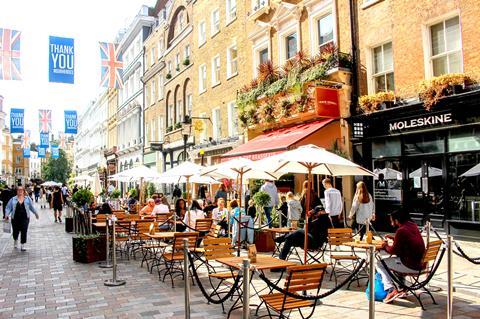Significant legislative changes were introduced during the Covid-19 pandemic to help businesses in the hospitality sector continue operating through lockdowns in compliance with social-distancing restrictions.

Some have since been ‘sunsetted’, or are likely to be, while others are being looked at as permanent changes. However, in the confusion, are businesses missing any tricks or facing any potential beartraps? We look at three specific legal regimes and how they may overlap.
Licensing
With customer activity driven outside throughout 2020 and 2021, a lot of legislation focused on ensuring operators could move their businesses into any available external spaces. Off-sale permissions were effectively extended across all on-licensed premises to 11pm and conditions on licences preventing off-sales were suspended to allow for sales into areas both forming part of the premises – car parks, for instance – and other public spaces away from the premises, such as highways.
These provisions have been extended annually since 2020 but are set to fall away on 30 September 2023. There is a consultation under way in which one option is to extend this, but as matters stand anyone seeking to permanently retain off-sales or avoid compliance with conditions will need to vary their licences to do so. This permission does not, and never did, allow for permanent use of structures or external areas on public land, which for some has been a point of confusion as any such use is legislated separately.
Planning
During the pandemic, changes to the planning regime as it related to outdoor areas meant that often a deemed planning permission was granted where a licence existed for that outdoor area. This position is not expected to continue past 30 September 2023.
For structures that were placed in the public highway, such as covered areas, planning permission now needs to be sought. The public have become more used to seeing this sort of structure on the street and it may well be that where these areas have been well managed, objections to planning applications may not be as likely as they may have been if such a structure was being proposed where one did not currently exist.
We are seeing renewed enthusiasm by neighbours and local planning authorities in investigating the planning status of structures that may have been erected by the hospitality sector over the past couple of years. In addition, it is likely that the law on immunity from enforcement action will be changed in the next few months, where structures that would have obtained immunity after four years will need to have been in existence for 10 years in order for the local planning authority to be prevented from taking enforcement action.
Property
Much attention was focused on the restrictions placed on landlords’ ability to enforce the terms of their tenants’ leases during the pandemic. With all these restrictions now largely lifted, the dynamic between landlords and tenants has once again shifted.
In March 2022, a new regime was introduced in England whereby landlords’ rights to forfeit for non-payment of rent were reinstated, with the exception that certain ‘protected’ rent arrears were temporarily capable of being referred to a new arbitration process, with the landlord’s other usual remedies for non-payment of protected arrears continuing to be unavailable. The closing of the arbitration scheme in September 2022, however, marked the end of all substantive Covid support for tenants.
These continue to be challenging times for leisure and hospitality operators and, with only limited direct sector support being offered in the recent Budget, the hope is that trading levels and consumer demand hold up until wider market conditions improve.
Katherine Evans is partner (planning), Philip Moran is partner (real estate) and Piers Warne is legal director (licensing) at law firm TLT




























No comments yet